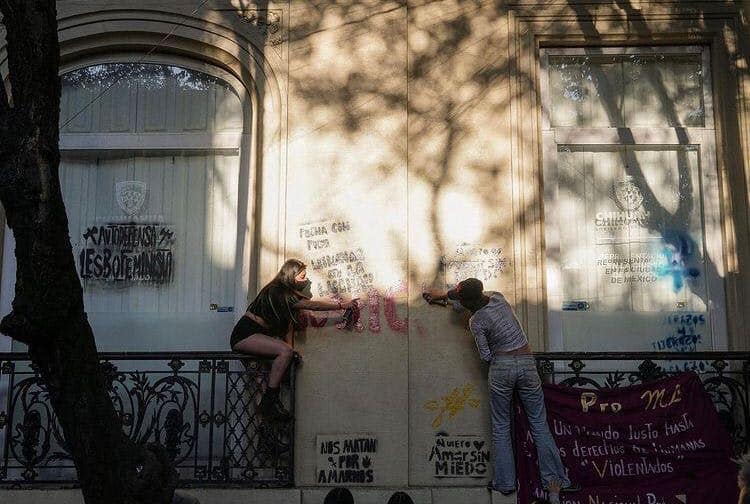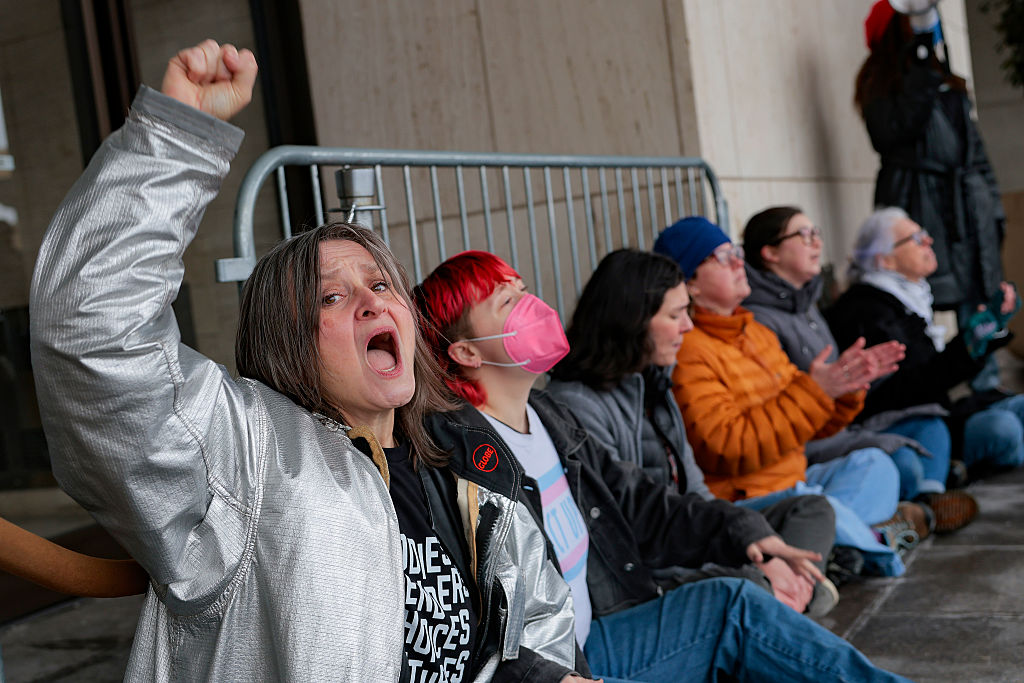Meet Mexico City’s Sapphic Separatists

There’s a plate of food for anyone who’s hungry, and a bed for any lesbian, queer or trans person who needs a place to rest.
Dusk pours golden light on the streets of Santa María La Ribera, Mexico City’s oldest suburb. Splendid 19th century homes in varying degrees of decay have been lived in and loved by generations of the same families. The streets are lined with trees, the almighty roots bust up and out through the concrete, cracking the sidewalk to pieces.
I ring the doorbell of La Comuna Lencha Trans, an epicentre of Sapphicism and socialism in Mexico’s capital. The jet-black door swings open and I’m greeted by a flurry of holas and como estas, then whisked up a couple of flights of stairs lined with feminist art. Within minutes, I’m seated at a dinner table with a plate of roasted zucchinis and rice alongside two of La Comuna’s nine residents.

“Eat, eat,” they implore, “we are busy anyway.” One is drawing a flyer for an anti-carcelario (anti-prison) demonstration, the other taps away on her laptop – she’s writing an academic paper on feminist justice.
Other members of La Comuna flap past in sliders and PJs; there are buzz cuts, stick’n’poke tattoos and face piercings aplenty. There’s also a Siamese kitten, months old, wandering around with eyes bluer than sky, a trail of melted Sapphic hearts in her wake.
On the face of things, La Comuna is an ordinary – albeit very cool – queer house-share. There’s an artist, a university professor, a musician, a sex worker, an electrician, and a psychologist currently in residence. The youngest member is in their mid-twenties, the eldest is in her forties, and they mostly herald from Mexico, but they are also Venezuelan, Argentinian and Chilean.
The group of Sapphics decided to live together in 2019, because they were finding it increasingly difficult to live in Mexico City. “The cost of living was rising, and most of us did not have stable work,” says a founding member of La Comuna, who asks that members not be named; “we speak in the voice of the collective,” they add.

Mexico City, the 7th largest city in the world, has recently gone through a well-documented period of “super-gentrification.” The city has absorbed swathes of digital nomads, many from the US, which has impacted the cost of living in all realms, though most notably in the housing market. In a 20 year period (2002-2022), house prices quadrupled, while the per capita labour income of Mexican citizens declined.
“We are also living in a city that works for capital,” a member adds, “and one of the greatest difficulties is when you are not adapted to this world, and you do not want to be – it is really hard to survive in Mexico City.”
La Comuna members criss-cross between Spanish and English as they speak of capitalism as an economic system that “exploits the land and people.” They would rather live outside this system – or at least away from the sizzling frying pan of expenses and consumption in megacities like theirs. They evoke visions of an autonomous, self-sustaining community, of rural settings where they can grow their own food, and reactivate traditional Mexican ways of living in community, “before colonisation and, even before the inquisition,” they say.
And yet, countryside dreams clash with the lived reality: Mexico City is one of the safest places to be queer in their country. “There are a lot of visible dissidents here, you always see lesbians and trans-people in the street, it’s not like that in the rest of the country,” says one. “I am from the north of Mexico and when I go there, it’s scary because the culture is already much more misogynistic,” says another, her forearms peppered in tattoos.
Mexico City is a non-negotiable for this collective of visibly queer activists. “And we decided the only way to live here was by organising ourselves to do a project together,” adds another member, who’s also sat down to a plate of zucchinis.

They poured themselves into La Comuna; through friends, the activists found, and fell in love with their current home. Then organised weekly meetings, delegated house responsibilities, and found ways of pooling together to sustain each other. Before long, they were hosting political discussions, workshops, demonstrations, fundraisers, and parties for the wider activist community. As the weeks unfolded they watched their home transform into a hub of political thought, direct action and communal living.
Primero yo la comuna First I La Comuna, Depues yo la comuna After me La Comuna, Luego yo la comuna Then I La Comuna. Abandona tus valores burgueses! Abandon your bourgeois values!, reads the sign on the mustard dining room wall. “We are building a revolutionary way of life,” says the lucky member who’s got the Siamese on her lap.
“But this is not les revolution,” she says, referring to the Zapatistas and other workers’ indigenous and socialist movements that rattled Mexico in the 20th Century. “We are not going to take to the streets with guns,” she continues, “we are not here to fight against this violent system with violence. For us, the revolution is day to day.”
“We are creating the world we want, now,” another member concurs. In Spanish, they speak evocatively of La Comuna’s intention to provide safety, sustenance and human connection, outside of the state – beyond capitalist individualism, romantic monogamy, and the family unit.
I query if their world would be solely comprised of FLINTA folks, and once the jovial chorus of si, si, si, claro’s has cleared, La Comuna ponder the shifts they see in queer women when they have space to call their own.
“Without masculine approval, without the masculine voice,” says one, describing the parties and poetry nights they host on their terrace, “the people who don’t feel safe to talk, start talking, start expressing,” she says. Another gleefully describes the liberation they experience on their terrace-cum-dancefloor at 3am; “we’re without t-shirts, dancing all together and we’re experiencing our bodies, our dissident bodies; without the male gaze, sometimes for the first time in our lives.”
“But,” another adds, “if something happened to a man at the hands of the state, let’s say he is a political prisoner, we also go to raise our voice.”
“Claro, it’s not like we hate men,” the other concurs, “it’s just we are looking to experience how is our world without their presence and it’s something different. If women always have to have male approval or men’s opinions, women don’t express at all what they have inside. So we separate things.”
The conversation rolls back into the number of political prisoners in Mexico. “All are campositos, the jails are full of poor people…” says one.
“In the United States, it’s the same, in Argentina too…” another member who’s just finished the dishes adds.
“Everywhere in the world it’s the same…” the other concurs. There’s palpable chemistry between the members, their ideas converge like a murmuration of birds. They speak of injustices they’ve personally witnessed, too. A focal point is their feminist friends who occupied the human rights building and turned it into a women’s shelter in 2020. “Our comrades are in jail. The state does everything; they put everything to investigate two girls, but if our neighbour is getting beaten and killed by her husband, or a woman is raped, suddenly not enough evidence, can’t do anything,” says the member with the Siamese.
Her words corroborate with the astounding government statistics on femicide which estimate that 10 women and girls are killed every day in Mexico by their family or intimate partner. This is met by extreme impunity for femicides – fewer than 3% are prosecuted, and 1% are sentenced – award-winning Mexican journalist Gloria Piña rooted this impunity in legal loopholes, negligence, and a lack of a gender perspective in their legal system.
Another cat gently weaves through ankles and table legs, as the conversation oscillates to the cataclysmic loss of Jesús Ociel Baena, the first openly non-binary magistrate in Latin America and one of the first people to be given a non-binary passport. “They went to Congress in a dress [designed] as an LGBT+ flag, they were unapologetic in their fight for equality, the most visible queer person…” says one.
“And the most visible queer person in Mexico was killed,” concurs another, visceral sorrow in her eyes.
On November 13th last year – having received a number of death threats and police protection four months prior to this – Baena was found murdered in their home, as was their partner Dorian Daniel Nieves. The police swiftly declared it a “crime of passion,” a murder-suicide perpetuated by Nieves; to the complete contestation of family, friends, and anyone who knew the loving couple.
The pain of Baena’s passing is felt in the marrow of every person in La Comuna’s dining room. The energy craters as we feel the harsh reality that Mexico’s most powerful, prominent and public-facing queer activist was violently harassed, then murdered months ago. La Comuna waits for updates of the case, though as familiar as they are with the state’s record of impunity, they expect nothing close to justice. They will likely need to mourn Baena without the de jure truth as to why they’re no longer here.
When I ask if they feel safe as queer people in Mexico in light of this tragedy, the member of La Comuna who’s a professor in feminist theory says that the reported murder rate of trans and gender-non-conforming people is the 2nd highest in Latin America; while queer people experience twice as much discrimination as the non-queer population. “But there are areas where you don’t feel this,” she says, referring to La Comuna, “areas where we build spaces that, for us, are our trenches, where we are allowed to be together, to fight, where we feel strong.”
A chorus of coo’ing ripples through the living room when another cat hops up to an open window and gazes wistfully toward the metallic sheen of city lights in the night’s sky. The felines seem to offer soft, furry release for this house of people who plunge – on a daily basis – into the shadowy realities of human society. Each of the members is deeply engaged, with heart and mind, in political struggles, and La Comuna feels like a vital incubator of shared perspectives, visions and desire to actively shift this world.
“There is not only the rights of being lesbian or being trans, also the fight of living in this messy world that is so full of injustice and violence,” says one waving their anti-carcelario (anti-prison) poster for the demo next week. Another forwards photos from demonstrations by the mothers of victims of violence and disappearances. “As a collective we want to participate as a political actor in this mess. Not only stay contained in the house,” says the youngest member of La Comuna.
I edge toward the final zucchini and am met with a rapturous, “please, please eat!”
“If there is food for five, there is food for ten, if there is space for nine, there is space for 15,” one says, referring to the fact that La Comuna often doubles up as a refuge for members of their community who find themselves houseless or in need of shelter.
I wonder how it is to live with nine other Sapphics, plus a relatively open door policy. “For me, it’s easy,” says one immediately, “you don’t have to cook or clean everyday, you cook one time a week, you clean one space in the house and everything else is done; it makes space to focus on other things, political things, it makes life easier.”
“Interpersonally,” adds another, in Spanish, “yes, we are under this umbrella ‘Lesbo, Trans, Feminists,’ but we are different, we have different political experiences, different ethical formations, we don’t necessarily understand things in the same way.”
“You need a lot of patience and conviction to live this way,” she says, “it’s like a laboratory, everyday,” to the acquiesce of the rest. The conversation dilutes into laughter and lightness – aided once again, by the cuteness of the Siamese. At La Comuna, we speak in soft voices about heavy topics while cats prowl around the house. It’s a peaceful place, where there’s a plate of food for anyone who’s hungry, and a bed for any lesbian, queer or trans person who needs a place to rest.
La Comuna Lencha Trans: @comuna.lenchatrans












